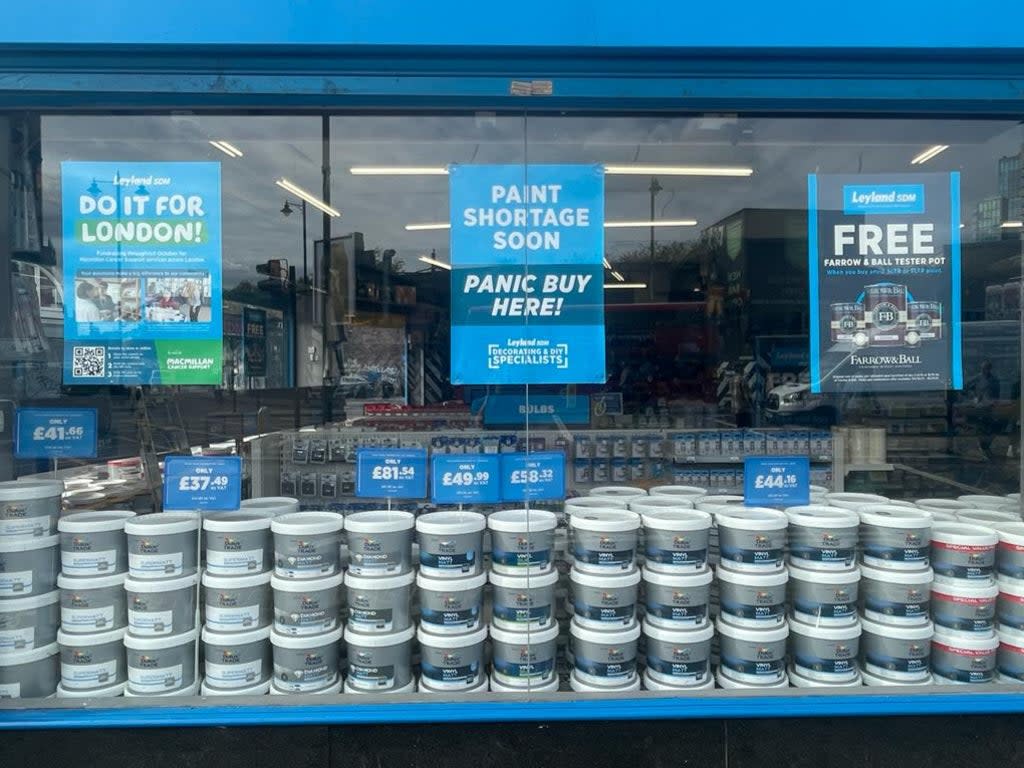Why paint could be next victim of UK’s supply crisis

Leyland SDM, a decorating and DIY supplies business with 32 stores across the UK, has recently hung posters in its shop windows reading: “Paint shortage soon, Panic buy here!”
Ordinarily, customers might have grinned and dismissed the slogan as a droll topical joke but in post-Brexit, pandemic-recovery Britain 2021, with barren supermarket shelves and queues around the block for petrol forecourts apparently now an everyday sight, are we absolutely sure this is definitely a gag?
“We haven’t actually seen any panic buying, it was more of a tongue-in-cheek bit of humour,” the company’s chief executive, Jonathan Jennings, reassures The Independent. “We like to throw in a bit of banter.”
“In terms of panic buying, we as a business did a little bit,” he explains. “We anticipated stock shortages coming into this year so, back in January, we did actually stockpile a lot of paint and key products, which has stood us in good stead.
“We’ve got a warehouse in Wembley, we’ve got a much smaller warehouse in Acton and another in Cricklewood in north London and we basically filled them up with as many pallets of paint as you could possibly get.”
That foresight has continued to pay off throughout the year, with the company’s bold initial outlay enabling it to keep its shelves lined with fresh paint tins, an all-important line that accounts for roughly half of Leyland’s business and which boomed during lockdown when bored homeowners turned to redecorating for entertainment and then again this year when shops and hotels moved to smarten up their premises before reopening.
While the demand is certainly there, the complex, interconnected nature of the global supply chain means that stores like Leyland cannot rest easily; just one supplier suffering a Covid outbreak at its manufacturing plant or failing to meet a delivery commitment could be all it takes to spark chaos.
“As soon as one of them actually does let you down and you’ve not got a back-up plan, you’ve then got a problem,” Mr Jennings says. “Whether you are making a motor car, a washing machine or a tin of paint, that’s what’s happening.”
The executive says his company faces a “constant battle to be first in the queue for production line manufacturing” and has “had to invest huge resources to stay ahead of the game”, notably making additional hires to stay nimble and remain on top of product sourcing.
“I wouldn’t say we’re not worried,” he adds.
Fears of a “great British DIY shortage” were last raised in late May when builders’ merchant Travis Perkins warned The Times that the price of bagged cement was about to rise by 15 per cent, chipboard by 10 per cent and paint by five per cent in response to high demand for raw materials from both home decorators and professionals, compounded by the supply chain issues that have since significantly worsened.
The Office for National Statistics forecast a rise of eight per cent in material costs at the same time.
More recently, Department for Business, Energy and Industrial Strategy figures have indicated that the cost of materials like roof tiles, cement and timber rose by a whopping 23 percent year-on-year in August and by 2.8 per cent month-on-month from July.
Brian Berry, chief executive of the Federation of Master Builders, tells The Independent: “For many months, tradespeople requiring building materials to complete projects have found them to be in short and uncertain supply, encountering inflated costs as a result of this.
“Our most recent membership survey highlighted that during Q2 2021, 98 per cent of builders had encountered material shortages and expected this to continue into the autumn.
“Smaller construction firms already operate on often slim margins and rely heavily on builders merchants having the materials they require on a day-to-day basis.”
For the Construction Leadership Council (CLC), the ongoing lorry driver shortfall is at the heart of the building industry’s woes.
“Within the UK, the shortage of HGV drivers is affecting every sector and will take many months to resolve, despite government action to increase driver testing,” the CLC said last month.
“This is a major contributor to delayed deliveries in all construction product areas; one manufacturer reported ‘factories piled with product that we cannot get out’.”

John Newcomb, chief executive of the Builders Merchants Federation, adds: “Builders merchants have done a fantastic job managing product demand and supply, but haulage remains the biggest issue we face at the moment and it is our top priority.”
Their assessment of the situation is echoed by Nigel Ogilvie, chief executive of the Painting and Decorating Association, who told P&D News: “During the main lockdown all of our members reported that things were going quite well, although whites, magnolias and emulsions were a bit of a problem and there were some real shortages in the northeast, down on the south coast and in the London area.
“The biggest area where it has affected us now is since Brexit kicked in.”
Mr Ogilvie says the majority of his organisation’s members use paints manufactured in Britain but often require specialist ingredients imported from the EU, which is now a much more complex bureaucratic business since Brexit, exacerbated by increased container shipping costs from Asia.
While stores like Leyland may have managed to keep their primary product in stock by astute forward planning, there’s no question that rising raw material costs and ongoing delivery issues are making it difficult for businesses to stay in control of the situation.
Shortages could crop up at any time through no fault of the retailer and British trading conditions remain decidedly slapdash.
Read More
Brexit made UK’s supply crisis worse than in EU, says French minister
UK to ease rules for EU lorry drivers to tackle post-Brexit supply crisis
Grant Shapps insists ‘Christmas will go ahead’ amid supply chain crisis
Christmas shoppers warned about post-Brexit charges on orders from EU

